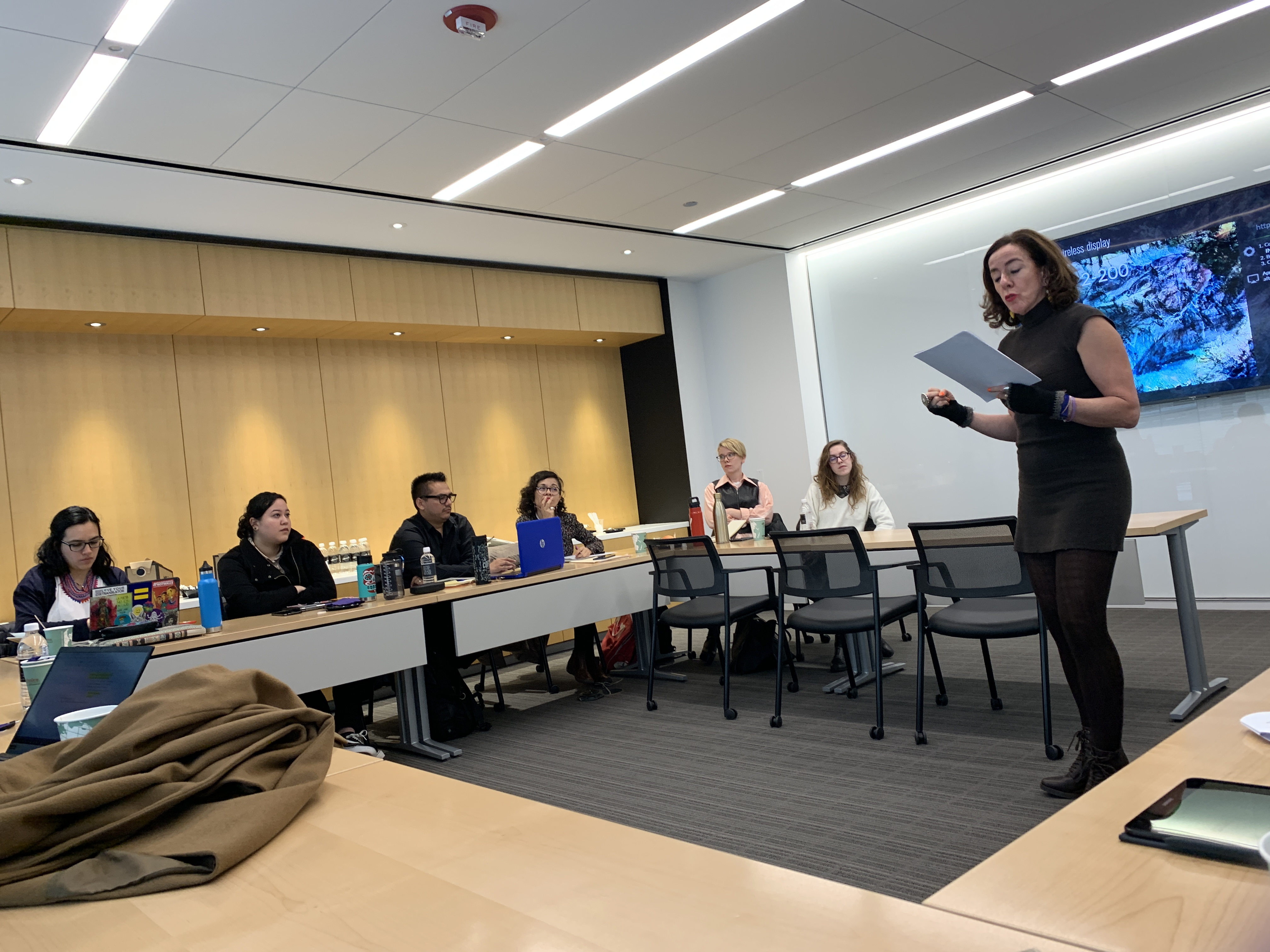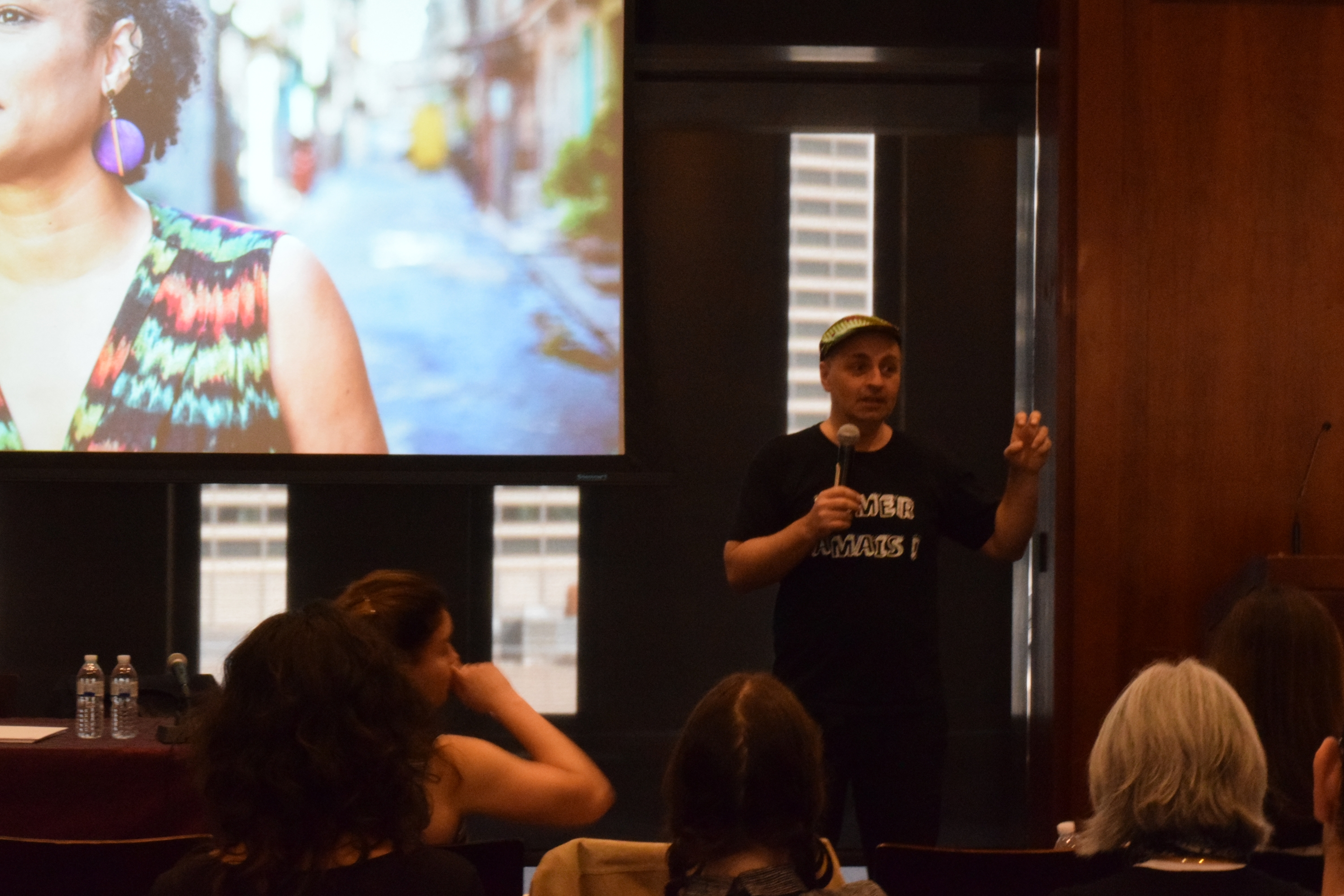Collaborations with UNAM
Since the inception of the CTGS project, cooperative projects between Universidad Nacional Autónoma de México (UNAM), Northwestern, and Rutgers have emphasized student participation in the development of new forms of teaching, and in projects at the borders of academia and the public realm.
These endeavors have enabled collaboration between student groups in different hemispheres whose commitments to a critically engaged university, and to the study of intersections between gender and social justice, also involved forms of public engagement, with a particular focus on gender and prison education. This included opportunities for students at Fordham and Northwestern to participate in the project convened at UNAM by project co-convener Marisa Belausteguigoitia and colleagues: “Spiral Women: Juridical Systems, Gender Perspectives and Pedagogies in Resistance, an academic and activist initiative that fosters women’s access to real justice, through practices of pedagogical, juridical, and artistic intervention in prison.” Similarly, UNAM students had the opportunity to participate in the Hacer Escuela project and its North American events.
Core activities have included a series of workshops (held in sequence in New York City, in Mexico City, and in Chicago) culminating in a event whose aim was to devise new syllabi through a cooperation between faculty and students at all three institutions.
This final workshop, “Errant Syllabi,” placed a focus on a new approach to bilingual environments that do not require full fluency and so are more inclusive, and on developing syllabi focused upon the shared research area of gender, sexuality studies and ‘cuir’ theory that are taught from the 'ground up' as much as the ‘top down.' The rapidly evolving nature of this field has meant that students may have access to new forms of expertise in advance of their professors. Another guiding principle was the production of shared forms of knowledge that 'global south'-located subjects participated in creating, rather than simply serving as the object of study for those in the global north, through a focus on reciprocal and shared learning and syllabus making.
CTGS Subprojects
- Critical Epistemology, Knowing through Gender and the Decolonial
- The University and Its Publics: North, South, and in Between
Visiting Fellows
Events
UPCOMING: Teaching Visit from Marisa Belausteguigoitia of UNAM (Spring 2021)
WORKSHOP: "ERRANT SYLLABI: LATIN AMERICAN AND LATINX FEMINIST, CUIR/QUEER, AND GENDER THEORY"
Over the weekend of October 18-20, 2019, the Critical Theory in the Global South project convened the 'Errant Syllabi' workshop, a series of collaborative meetings organized with the purpose of undertaking innovative critical maneuvers in syllabus production for academic courses taught under the rubric of Latinx and Latin American Gender Theory. The workshop, which took place on Northwestern University's Chicago campus, included the participation of UNAM's Marisa Belausteguigoitia, Rutgers' Andy Parker, and Northwestern's Penelope Deutscher, as well as several graduate students from each of those institutions. A detail precis of the workshop events and outcomes, written by Northwestern PhD candidate in Philosophy, Carmen De Schryver, can be found here. The workshop schedule can be found here.
WORKSHOP: "CRITICAL PEDAGOGY AND PERSPECTIVES ON GENDER"
From November 19-23, 2018, scholars from UNAM, Northwestern University, and Rutgers University gathered in Mexico City for a workshop on the topic of critical and decolonial pedagogy, especially as it relates to issues of feminism and gender. Two questions that guided the week included: How is a critical/decolonial classroom/university constructed? How is a critical/decolonial curriculum constructed? In seeking out answers to these questions, scholars actively observed how teaching must accommodate everyday violence in precarious contexts such as the prison and public universities during times of civil unrest (particularly in México regarding the contemporary tragedy of mass violent disappearances of young women). Activities focused on the role of the body and the role of art, two pedagogical resources often under-utilized in less precarious settings. In preparation for the week, scholars read a number of texts on critical pedagogy, and were asked to engage with contemporary issues of violence in México through other readings and videos.
Participants joined in several planned activities. Perhaps most notable, they attended Santa Martha Catitla, an all-women’s prison outside of Mexico City, in order to learn about “Mujeres en Espiral: sistema de justiciar, perspectiva de género y pedagogías en resistencia” (Women in Spiral: The Justice System, Perspectives of Gender, and Pedagogies of Resistance), a project led by Marisa Belausteguigoitia of UNAM. The project centers on visual art as an ineliminable pedagogical method within precarious learning settings such as prison. Other activities included: a workshop entitled “Dissidence, the body, and critical thinking” in which scholars were asked to explore movement and dance as critical pedagogy, a special symposium from Marisa’s undergraduate students who paired theory with their own experiences of violence in México, and a seminar on curriculum from the global south. At the end of the week, scholars developed ideas for further collaboration, such as jointly generating syllabi, translation projects, and applying insights gained from the week into their own classrooms, and/or into non-academic contexts they might be involved with.
WORKSHOP: "HACER ESCUELA/INVENTING SCHOOL (PART ONE)"
The first Hacer Escuela/Inventing School workshop took place from April 13-14 at Fordham University's Lincoln Center campus. The conference included talks by Walter Kohan, Frances Negrón-Muntaner, and Doris Sommer. Marisa Belausteguigoitia attended the workshop, along with three members of Colectivo las Penélopes, a UNAM-based feminist collective. Click here for the conference website.

Walter Omar Kohan (Universidade do Estado do Rio de Janeiro and NEFI) at Hacer Escuela/Inventing School
